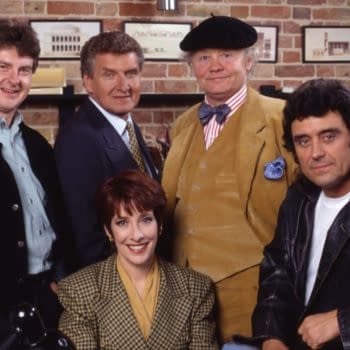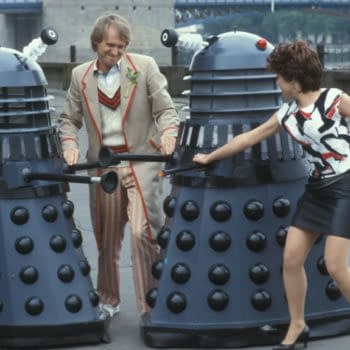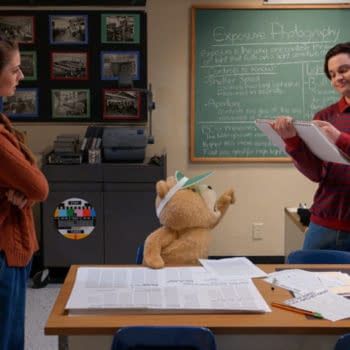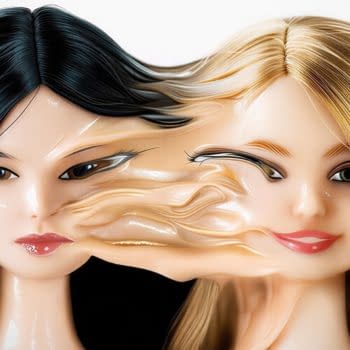Posted in: Movies, Review, Warner Bros | Tagged: barbie, greta gerwig, margot robbie, mattel, ryan gosling
Barbie Is A Fluffy Existential Comedy About Toys & Gender Roles
Barbie is an imperfectly silly comedy about the flaws of a perfect toy in an imperfect world that only silly people will hate.
Barbie is supposed to be a camp, fluffy, slightly knowing comedy that families can take their kids to that sells toys. Instead, in the hands of Greta Gerwig, it becomes a whole meditation on what Barbie represents, the changing and different relationships that girls have had with their dolls, gender roles in society, and the imperfect feminism sold by capitalism that pushes rampant consumerism.
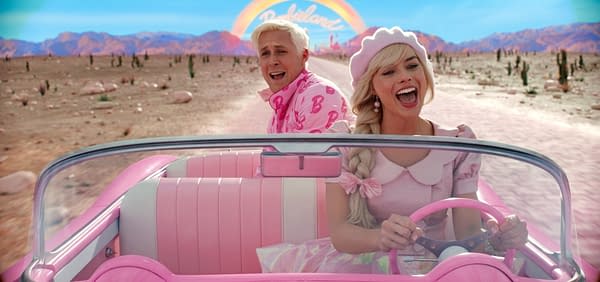
Barbie Gains Consciousness! Uh-Oh!
It begins with the premise, "What if Barbie had an existential crisis?" Margot Robbie plays Stereotypical Barbie, the doll that doesn't have a career or ambitions, just the perfect lifestyle. She has a Stereotypical Ken (Ryan Gosling), who just wants to be her boyfriend but is increasingly frustrated with being taken for granted and his lack of any agency. They live in Barbieland with all the other Barbies and Kens. When Barbie starts having thoughts of death, getting cellulite, and her feet got flat, she seeks guidance from Weirdo Barbie (Kate McKinnon), the doll who was messed up by the kids who played with her. Weirdo Barbie sends her to the "real" world to find the girl who played with her, as her existential thoughts must have come from her. That girl has grown into a middle-aged mother Gloria (America Ferreira), a junior executive at Mattel, amid a midlife crisis with a surly teenage daughter named Sasha (Ariana Greenblatt). Sasha thinks Barbie is the figure responsible for creating impossible standards of beauty and femininity in girls and setting back feminism. Meanwhile, Ken, who has followed Barbie into the world, discovers the sexism and dominance of Century City business bros and decides to bring the patriarchy to Barbieland. Even Barbie herself is a victim of impossible standards. As a toy and an idea, she gets criticized for pushing impossible standards of beauty that has damaged feminism.
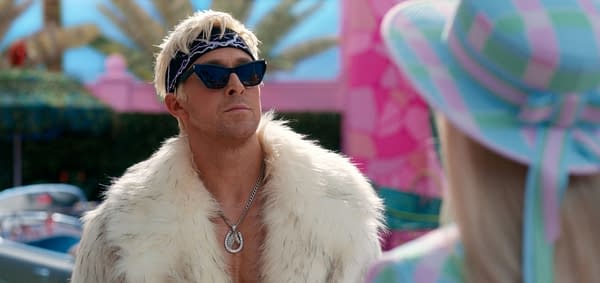
Greta Gerwig wears all the Gender Studies texts on her sleeve as she treats the movie as a feminist satire on not Barbie but feminism itself and male sexism. The movie pokes fun at the contradiction of Mattel's all-male upper management making money selling the pre-packaged feminism of Barbie to girls. Having Will Ferrell as the fussy CEO with a very silly board of executives implies that they're dolls as well, action figures of men in suits playing their roles as capitalists desperate to keep the status quo steady. Where Gloria was playing with Barbie, Gerwig was playing with her Silly Capitalist Executives Dolls. Barbieland and the "real world" are Gerwig's playset inside her head that she's put on screen.
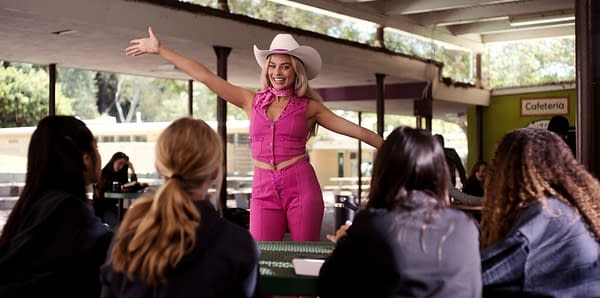
Ken Gains the Wrong Kind of Consciousness! Uh-Oh!
Ryan Gosling steals the whole movie as the angst-ridden, resentful Ken who becomes Incel Ken. His discovery of the patriarchy is hilarious, especially when his attempt to implement it is really an outmoded adolescent's idea of Patriarchy. It's a gently mocking, surprisingly forgiving spoof of toxic masculinity that's tinged with more affection than the haters realize. Ken is, at heart, an unsupervised thirteen-year-old boy and his idea of masculinity and male dominance is out of date by at least twenty years. Gosling proves here that deadpan comedy is his real calling, more than the dark, angst-ridden drama he's most known for. He's clearly having a ball with his knowingly ironic portrayal of Ken, and it has so much depth and humor that it tilts the movie in Ken's favor because of the nuances Gosling finds in the character. Satire is polemical and didactic, but Gerwig isn't out to condemn the most violent and vile aspects of misogyny and toxic masculinity, merely the silliness of male insecurity. Barbie is not the forum for that, and Gerwig isn't so blind as not to point out that Barbieland's matriarchy is as unequal to men as the real-life patriarchy is to women.
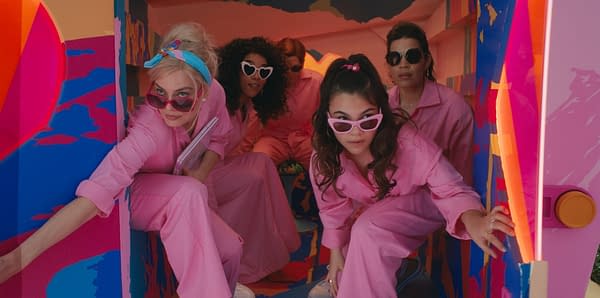
Barbie: Only Silly People Hate a Silly Little Comedy
Some haters dismiss Barbie as man-hating and woke, but as an anecdote, we saw the movie at a suburban multiplex, and the white thirteen-year-old boy who sat next to us laughed at all the jokes, particularly the ones about Ken and his silly attempts at manhood and patriarchy, only leaving to refill his soda and popcorn to return and laugh some more. He got very comfortable in his AMC seat and curled up in it like it was his sofa at home as he reveled in the movie. The fifteen-year-old girl in the same row laughed less than he did. Barbie, the movie, the doll, and the fictional avatar played by Margot Robbie and the other actresses, are not here to solve society's inequalities. It's a comedy that makes fun of the problems that exist. They're just here to make you think about them a little, with some jokes along the way. Only the angriest, most insecure people would think this movie hates men and wants to destroy society. It's a comedy that thinks everyone is silly and just wants you to have a giggle at that. An imperfect comedy made under Capitalism is not going to bring down Capitalism.
With all the discourse and debate about the feminist didacticism in Barbie, you might dismiss it as an extended Gender Studies essay with jokes, but it has real poignance at its heart: it's really about the fear mothers have of losing touch with their daughters, the legacy they leave for them, and accepting the joy and sadness of being alive. It's about awakening consciousness and what happens when a stereotype becomes a person.
Barbenheimer Makes More Sense than You Expect
Oppenheimer and Barbie make a fascinating double feature (though we don't recommend watching them both on the same day). Oppenheimer is about the burden and mistakes of men, Barbie is about the burden and mistakes of women. The theme that unites both movies is existential dread. Oppenheimer is about the existential dread of human extinction. Barbie is about the existential dread of living under the impossible demands of proscribed gender roles. Oppenheimer ends with the horror of impending death. Barbie ends with the relief of being alive.
You want to see Barbie. You know you do.





